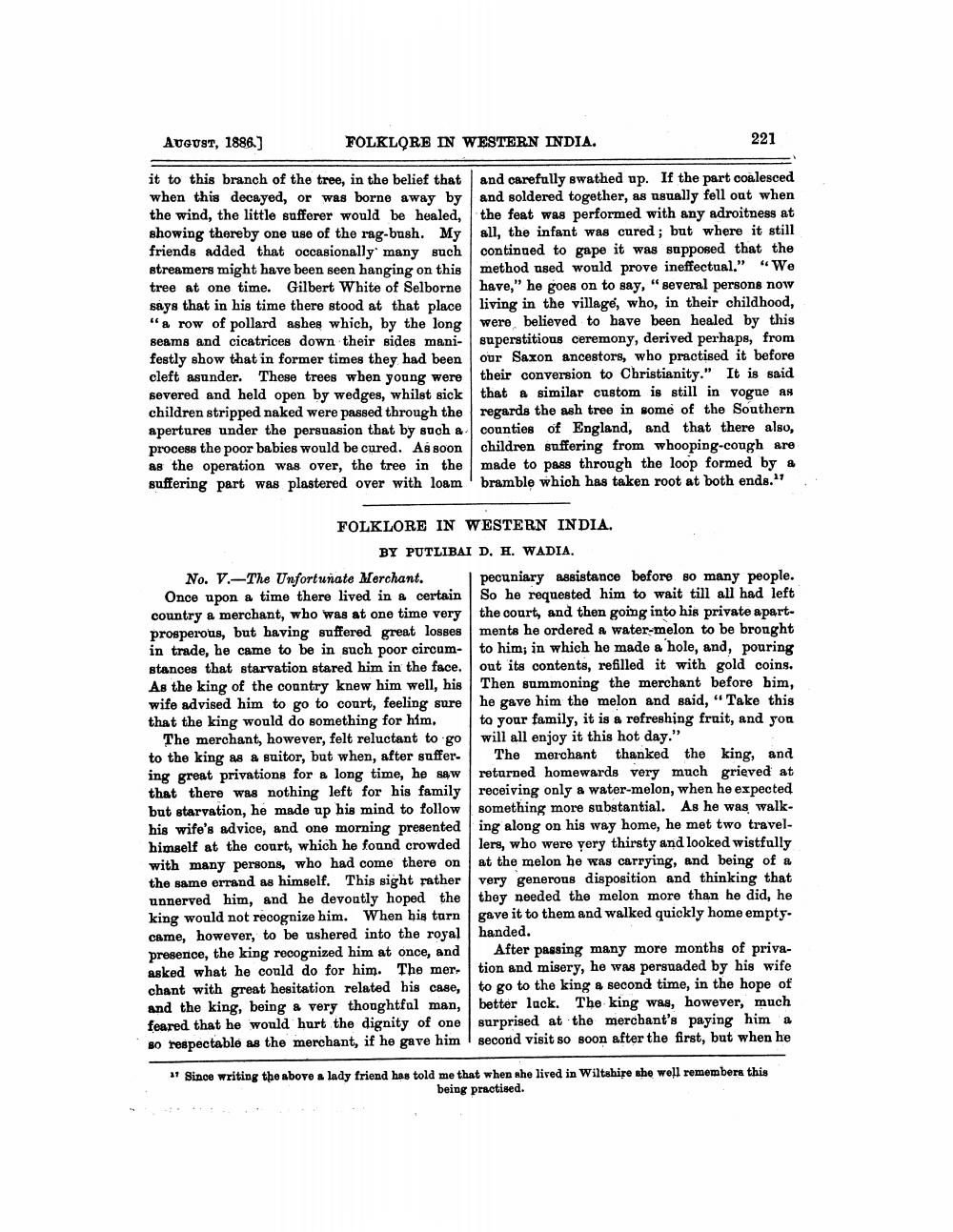________________
AUGUST, 1886.)
FOLKLORE IN WESTERN INDIA.
221
it to this branch of the tree, in the belief that and carefully swathed up. If the part coalesced when this decayed, or was borno away by and soldered together, as usually fell out when the wind, the little sufferer would be healed, the feat was performed with any adroitness at showing thereby one use of the rag-bush. My all, the infant was cured; but where it still friends added that occasionally many such continued to gape it was supposed that the streamers might have been seen hanging on this method used would prove ineffectual." "We tree at one time. Gilbert White of Selborne have," he goes on to say, "several persons now says that in his time there stood at that place living in the village, who, in their childhood, "a row of pollard ashes which, by the long were believed to have been healed by this seams and cicatrices down their sides mani- superstitious ceremony, derived perhaps, from festly show that in former times they had been our Saxon ancestors, who practised it before cleft asunder. These trees when young were their conversion to Christianity." It is said severed and held open by wedges, whilst sick that a similar custom is still in vogue as children stripped naked were passed through the regards the ash tree in some of the Southern apertures under the persuasion that by such a counties of England, and that there also, process the poor babies would be cured. As soon children suffering from whooping-cough are as the operation was over, the tree in the made to pass through the loop formed by a suffering part was plastered over with loam bramble which has taken root at both ends."
FOLKLORE IN WESTERN INDIA.
BY PUTLIBAI D. H. WADIA. No. V.-The Unfortunate Merchant. pecuniary assistance before so many people. Once upon a time there lived in a certain So he requested him to wait till all had left country a merchant, who was at one time very the court, and then going into his private apartprosperous, but having suffered great losses ments he ordered a water-melon to be bronght in trade, he came to be in such poor circum- to him; in which he made a hole, and, pouring stances that starvation stared him in the face. out its contents, refilled it with gold coins. As the king of the country knew him well, his Then summoning the merchant before bim, wife advised him to go to court, feeling sure he gave him the melon and said, "Take this that the king would do something for him. to your family, it is a refreshing fruit, and you
The merchant, however, felt reluctant to go will all enjoy it this hot day." to the king as a suitor, but when, after suffer- The merchant thanked the king, and ing great privations for a long time, he saw returned homewards very much grieved at that there was nothing left for his family receiving only a water-melon, when he expected but starvation, he made up his mind to follow something more substantial. As he was walkhis wife's advice, and one morning presented ing along on his way home, he met two travelhimself at the court, which he found crowded lers, who were yery thirsty and looked wistfully with many persons, who had come there on at the melon he was carrying, and being of a the same errand as himself. This sight rather very generous disposition and thinking that unnerved him, and he devoutly hoped the they needed the melon more than he did, he king would not recognize him. When his turn gave it to them and walked quickly home empty. came, however, to be ushered into the royal handed. presence, the king recognized him at once, and After passing many more months of privaasked what he could do for him. The mer. tion and misery, he was persuaded by his wife chant with great hesitation related his case, to go to the king a second time, in the hope of and the king, being & very thoughtful man, better lack. The king was, however, much feared that he would hurt the dignity of one surprised at the merchant's paying him a so respectable as the merchant, if he gave him second visit so soon after the first, but when he
"Since writing the above a lady friend has told me that when she lived in Wiltshire she well remembers this
being practised.




